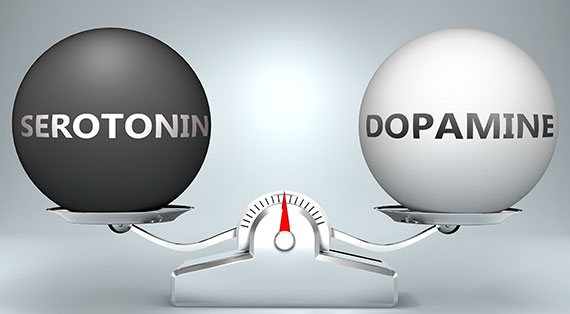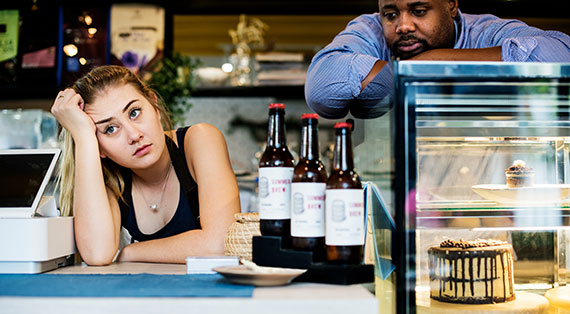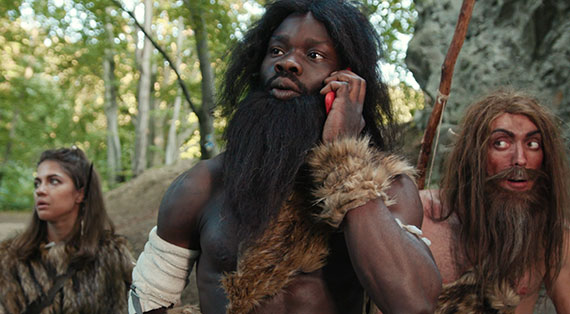Why do we always want what’s bad for us?
We get addicted to things we used to enjoy, the nicest foods are the ones that are bad for you and the bad boys and mean girls are irresistible. But why?
Dopamine is such a powerful influence on our lives. It makes us want to move, and then it makes us want to move faster for longer.
It makes us want things. Makes us attracted to someone, then makes us obsessively love struck. It makes us addicted to drugs alcohol, cigarettes, and sugar. And it can make us feel like gods, win medals, succeed in life, and fall in love.

So – what is this miracle molecule and why is mastering it the essence of a happy balanced life?
Dopamine is a neurotransmitter, which means it is a molecule, secreted by a neuron, that affects other cells by sending a signal across a synapse. In other words, it sends a message to another cell to do something. It was discovered in the 1950s and we are still learning about its complexity today.
And the primary message it was designed to send was “move.” Parkinson’s Disease causes mobility issues because there is a breakdown in the brain of the ability for dopamine to send its message to the muscle. So how is it connected with wanting things?
Back to the caveman
You are sitting in your cave feeling hungry. You fancy a nice rabbit and a bit of sorrel. So, what do you have to do? Move. The urge to have dinner motivates you to move. And I used that word deliberately. The definition of “motivate” is “to stimulate forward action.” Wanting something means you must get it. Or it did when dopamine was useful, harmless and a lifesaver. To be the best hunter you needed to run faster, for longer. So why can it go rogue?
Dopamine makes you feel good while you are hunting and then once you have the rabbit and the sorrel, taking the meal home to your family makes you feel benevolent and content. Dopamine switched off when you had picked the sorrel and chased the rabbit down. Serotonin made you grateful to have them to take them home to your family. And you need this syncopated rhythm of the two to stay happy because dopamine highs are always followed by dopamine lows. They need to be. If you go out to catch a rabbit you need to be motivated to stay out there trying, until you succeed and before can change your state to contentment at catching one, so you know to go home to your family rather than staying out there for a week catching more and more rabbits. It’s how humans survived. Feeding your family was paramount.
The great myth
The great myth is that getting and having the thing is what makes you get the dopamine. It does not. The joy of having the thing comes from serotonin. Dopamine tells you your life will be immeasurably better if you get those boots that make you feel like a film star. That if only you have that thing, life will be perfect and golden. Dopamine can make us delusional.
Postnatal depression
Postnatal depression is a stark example of dopamine being destructive. We build up the dopamine fuelled expectation, the promise, the thrill of carrying this baby, weaving our dreams for it over the months we carry it, every picture a perfect one of warm fuzzy smells and radiant motherhood. And after the birth there will be a natural crash where the dopamine levels normalise. But if something has not lived up to the expectation, the delivery has been traumatic, the baby is far from a warm bundle of gurgling joy, and Mum cannot get to wash her hair for a week, the crash is massive.
The dream house
You tell yourself that the new house will be your home for life and the place to nurture your growing family. It is all you will ever want. Yes, it is on a main road, and the layout is quirky, but that does not matter. You love it, just must have it! Imagine all the blissful Christmases, the new-borns you will bring home to it. You make an offer and when you think you might lose out, you up it. You cannot sleep for the longing for this wonderful house. No other house will do. That is dopamine talking. But when you have the house, unless you spend your days loving and being grateful for it, a bigger, brighter one, on a quiet road beguiles you and suddenly your house is cramped and pokey and noisy. You want more.
Relationships
We do it in relationships too. The thrill of the chase…. The lust, the idolisation, the girl/boy of my dreams. “I cannot be a moment without them.” Until you move in together and life becomes dull and predictable, suddenly the person you see at work every day makes you catch your breath instead. “What will she be wearing? Will she look over at me? Will we go out to lunch at the same time?” The relationship at home breaks down….” we just fell out of love.” No, it is just they did not trigger your dopamine. We stay in love when we are grateful for this person, learn to be content with them, get companionship and they lighten our days. We get serotonin from being with them. But if we are not cued to serotonin, and we want the high of dopamine, we become commitment phobic.
Treat ‘em mean and keep ’em keen
The old phrase “treat ‘em mean and keep ’em keen” has a ring of truth, because what makes dopamine work is what is called a reward prediction error. If you get more than the reward predicted, Dopamine neurons will show strong responses. If the reward is as predicted or is less than predicted the Dopamine response does not happen. So, if your suitor never knows what to expect, and is occasionally delighted, they will keep getting the dopamine reward. But if life is in a rut and predictable, they will not. Variety is indeed the spice of life. Its why we look at friends with bad boy boyfriends and drama queen girlfriends and think “why do they put up with that behaviour?.” Because they become addicted to it. Because they cause pain a few times, but then, they cause delight just often enough to keep the longing. It’s why your mother told you to be hard to get. Keep the hunter, hunting.
What makes gambling so addictive?
The manufacturers of gaming machines know there is a magic formula that if you get a win every so many goes, it will be enough the keep your dopamine levels up, so you keep pressing those buttons, knowing that soon, the bells and lights will go off and you will win. Left too long, you would lose interest, but while there is a possibility the next try will be the one, the Dopamine will keep you at it. But when you have played that machine a lot, and you know that after 20 minutes you will get a £20 jackpot, you move on to the less predictable £100 machine that may not pay out as often, but the prize, that wonderful prize, will be greater. And there is still a realistic chance.
Addictions
Alcohol, and cigarettes are horrible when we first taste them, but we are on a promise. We will look grown up, sophisticated, hard, sexy… so we persevere. The truth, of course falls well short. We do not become James Bond or Rene Zellweger. We become ill, and more obsessed with having a cigarette than anything (why else would smokers spend half the evening outside in the rain on the pavement, rather than in the warm, having fun with their friends). Because the only thing that will fix the horrible crash from the dopamine high you just got from the last cigarette is another cigarette, and then that does not really give you much, so you smoke, 10 a day, 20, 30, 40. Dopamine tells you cigarettes will relax you. They do not. They make you more anxious and depressed. But you will have another one, just to check….

Chocolate
People will tell you chocolate gives you dopamine so you will be contented. It does not. Dopamine makes you think about chocolate. How lovely it will make you feel, how silky in your mouth, like a sweet nectar. Dopamine will make you get up and get it. Dopamine will make you savour the first chunk. Then dopamine will leave you. And when you get the inevitable crash, it will suggest only another bit will bring you back to that heady thrill. But it does not. The second bit is not as good. The third bit makes you feel a bit sick.
Dopamine will keep telling you, you can feel good from chocolate because sugar gives you a massive energy hit. So do fatty carbohydrate heavy foods. In evolutionary terms, that means they are useful for quick energy, but to do what? What do you need the energy for? Not to chase a rabbit, find some sorrel, or fight off a hostile tribe’s man.
Drugs are worse. The dopamine hit from crack cocaine is the fastest most powerful hit you can have. But as night follows day, the crash will come, and your circuits are now so fried from the overload, only one thing will give you that again.
How do we tame dopamine?
Remember it was created to help you move. So, exercise is a wonderful way to accept the inevitable low. When you go for a run, you came back and have a shower and you want to rest for a bit. And that resting, just daydreaming, and doing nothing, feeling good, and contented releases serotonin, the neurotransmitter of contentment and happiness with what we have. Because we used it appropriately, it will give us the appropriate low. Rest.
If dopamine is wanting what we do not have, serotonin is about being happy with what we do have. So, some time in contemplation, time with friends laughing and happy, calling an elderly relative who will be happy to hear from you, recording and recollecting those magical moments in life – the birdsong, the shapes in the sand when the tide goes out. These are the feel-good moments that are the antidote to dopamine. All of us have them, even on the worst days. We just need to take the time to see them.
We need dopamine to function, to achieve, to better ourselves. But we need to use it in balance.
The essence of my work is helping clients find that balance. Being permanently fuelled by dopamine is stressful. It causes anxiety and can lead to depression, delusional and obsessive thoughts, and an inability to feel happy, despite having so much. But harnessed appropriately it drives us to achieve our goals and achieve things we never thought we could. Find out more about our services
Next time I will talk about burnout and how managers can keep their workforce stress free, on task and productive.




